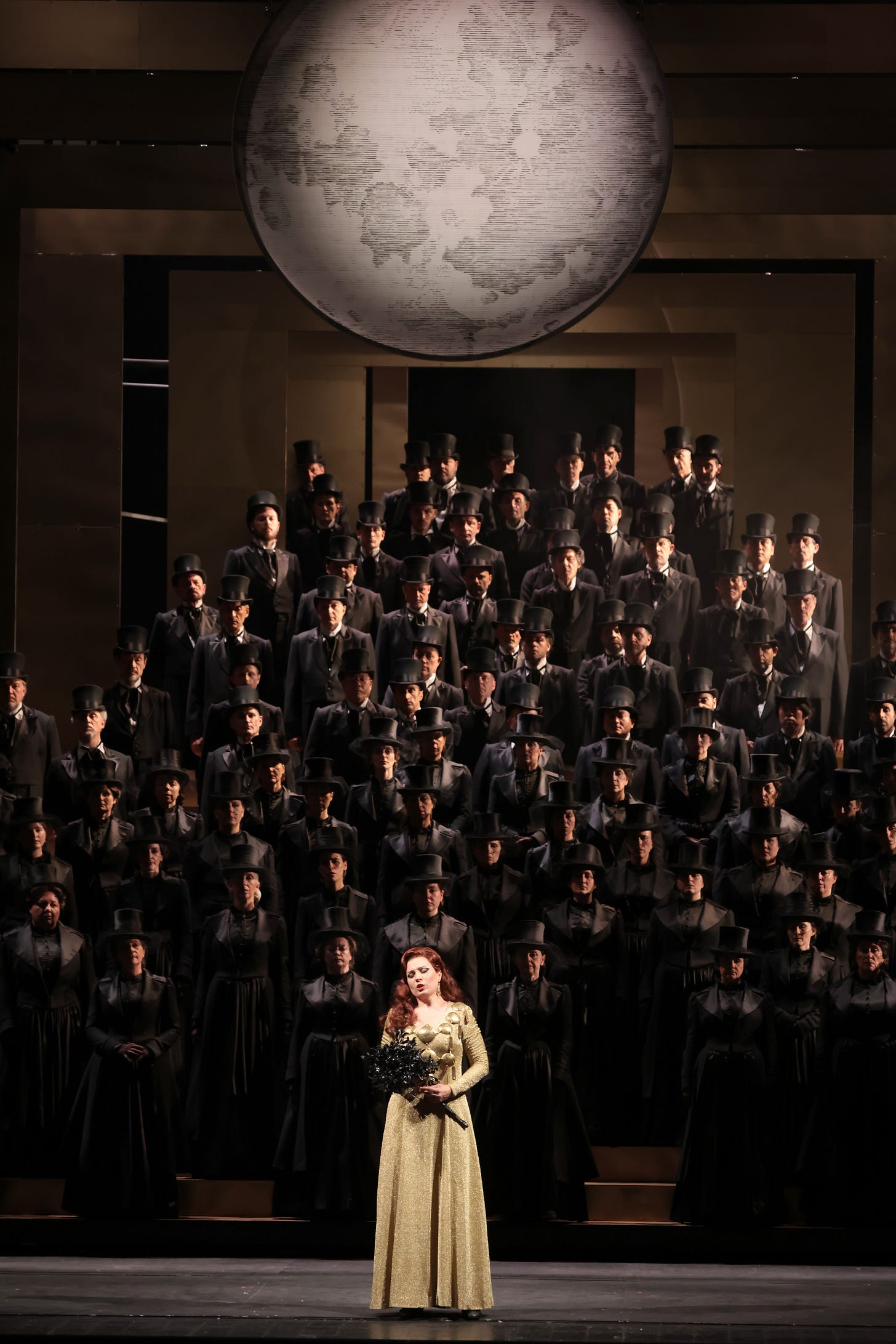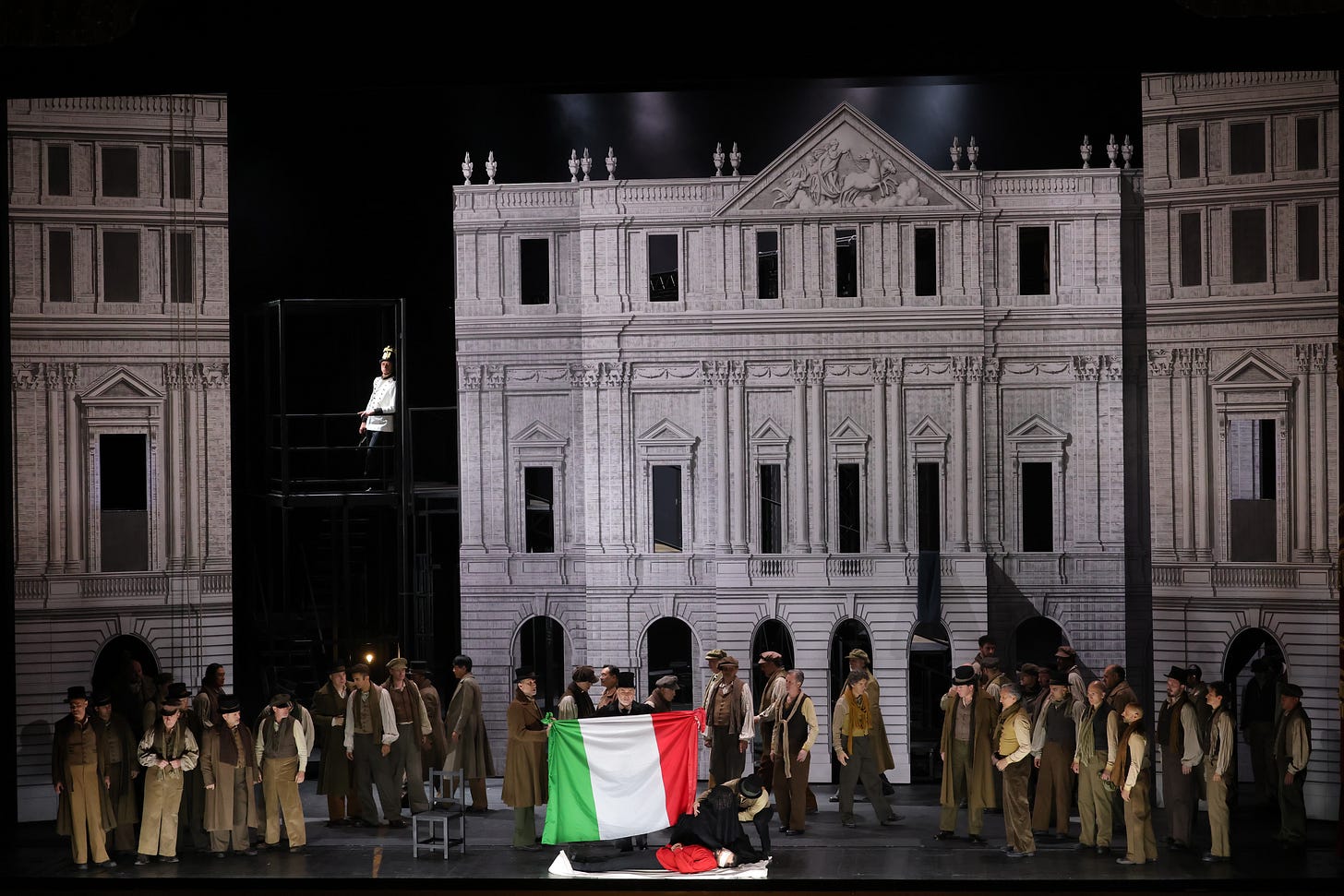Casta diva: Marina Rebeka (Norma) invokes the goddess of the Moon. Coro del Teatro alla Scala Picture © Brescia e Amisano
An edited version of my review which appears on Oper! Magazin’s website in Jan Geisbusch’s German translation. It is republished here by kind permission of Oper!’s editor, Dr. Ulrich Ruhnke
Conventional wisdom tells us that Maria Callas’s interpretation of Bellini’s Norma put this jewel of the bel canto era firmly back on the operatic map. She did so at La Scala, Milan, the theatre where Norma had received its first performance in 1831 and where Callas was the reigning diva in the early 1950s.
La Scala’s latest production - the first since Montserrat Caballé assumed the title role in the mid 1970s – tells a different story. The assumption that Callas unlocked the ‘lost treasures’ of bel canto, and Norma in particular, bears no scrutiny, as Bellini’s opera was regularly revived in the 19th century, even though singers had supposedly lost the virtuosic art of the early ottocento composer. In the latter half of that century, the longest gap between productions of Norma was 22 years.
But half a century has elapsed since Caballé’s La Scala performances - enough to suggest that Callas still casts a long shadow over Norma, especially in this theatre. Any singer venturing the title role in the home of Italian opera, as Latvian soprano Marina Rebeka has just done, is taking on a formidable challenge.
Norma may not be a one-woman show, but ultimately it stands or falls by the protagonista. Rebeka gives a valiant, if far from completely convincing performance of the druid high priestess - a line-drawn sketch of what Bellini’s anti-heroine can be in the theatre, rather than a full-colour portrait.
Norma contemplating a golden skull: Rebeka Picture © Brescia e Amisano
Rebeka was clearly nervous as she launched rather tentatively and tremulously into a short-breathed ‘Casta diva’: it lacked a sense of dreamy incantation and lunar beauty. As the evening progressed she warmed to the task, unleashing penetrating acuti and perfectly controlled pianissimi at the top of her voice, which carries well in a theatre of this size. Lower down the range Rebeka was less effective: her ‘Tremi tu’ to Pollione was far from blood-curdling, and the opening line of her final confrontation with her perjured lover, ‘In mia man alfin tu sei’, self-evidently lies too low for her. The highlights of her performance were the two duets with Adalgisa, especially ‘Mira, o Norma’ and its dashing cabaletta - taken at a lick by the conductor Fabio Luisi, as if to suggest he had been listening to Cecilia Bartoli’s scholarly edition of the score with her Malibran-inspired mezzo-soprano adaptation of the title role.
Luisi’s fresh approach to tempo and articulation was the evening’s most radical element, as far distanced from Callas’s conductors (Ghione in 1952, Votto in 1955) as can be imagined. Certainly Bellini’s score gets a spring cleaning in this new production.
La Scala onstage at La Scala in Olivier Py’s concept of an Italian-Austrian Imperialist conflict: Michele Pertusi (Oroveso) holding the Italian flag over an executed partisan Picture © Brescia e Amisano
The most satisfactory of the principal singers was Russian mezzo Vasilisa Berhzhanskaya - more a Rossini voice than the Verdian big-hitters who sang Adalgisa for much of the 20th century, and her lighter timbre certainly helped Rebeka in their duets. Pollione was sung by Freddie De Tommaso, the rising British tenor (born in Tunbridge Wells to native Italian parents) whose promotion to the front rank of ‘Italian’ tenors has been something to marvel at. His voice fills La Scala with big, almost baritonal tone, even if he sounds strenuous at the top - more like a tenor with 25 years’ service in leading roles rather the five or six since his assumption of romantic leads at Covent Garden. Like so many promising aspirants to the mantle of Pavarotti and Domingo, De Tommaso is already forcing his voice mercilessly, and you have to wonder how long this career strategy will keep him going.
At the other end of the age spectrum, the Oroveso of Michele Pertusi, dressed like an early 20th century homme d’affaires, inevitably sounds more senior now than he did in the production which Salzburg made for Bartoli a decade ago. In the comprimario parts, Laura Lolita Perešivana’s Clotilde and Paolo Antognetti’s Flavio were ‘correct’ (as they say in Italy).
“Rossinian” Adalgisa (Vasilisa Berzhanskaya) meets stentorian Pollione (Freddie de Tommaso) Picture © Brescia e Amisano
But La Scala’s attempt to reclaim Norma for the modern repertoire was scuppered by French director Olivier Py’s busy, unfocussed and distracting production. His set and costume designer, Pierre-André Weitz references both the period of composition and the location of its first performance in his complex revolving set - a working model of La Scala in outline, framing the internal skeleton of a theatre with its maze of coulisses and backstage stairways.
Ancient Gaul and the Romans are banished. Fair enough - but to unfold the narrative in a ‘contemporary’ context brings its own series of problems. The execution of an Italian partisan by soldiers bearing the colours of the imperial Habsburg monarchy might have been a compelling dislocation of Norma’s time frame, but Py encumbers his narrative with other layers of activity. A team of torso-baring male dancers regularly upstages the singers at their most inward moments, while a ‘Medea’ subplot enacted by silent extras fills the stage with information that could be conveyed in a programme essay. One could sense the patience of La Scala’s first night audience running low, so it was hardly surprising when the production team were met with a storm of ill-tempered boos and whistles at their curtain call.
Cast & Creatives
Norma: Teatro alla Scala
Norma Marina Rebeka Adalgisa Vasilisa Berzhanskaya Pollione Freddie de Tommaso Oroveso Michele Pertusi Clotilde Laura Lolita Pereševana Flavio Paolo Antognetti
Orchestra & Coro of Teatro alla Scala
Conductor Fabio Luisi Chorus Master Alberto Malazzi Director Olivier Py Sets/Costumes Pierre-André Weitz Lighting Bertrand Killy Choreography Ivo Bauchiero
Performance attended June 27 (first night)
Further performances: June 30, July 4, 8, 11, 14, 17, 2025
Website: teatroallascala.org








Bartoli's Norma is a "special case" - I'd say the most dramatically compelling performance of the role I have seen, but some - not me - take issue with her vocal conception of the part.
He's probably the most Italianate tenor voice the UK has right now. Is he overexposed for such a young singer?